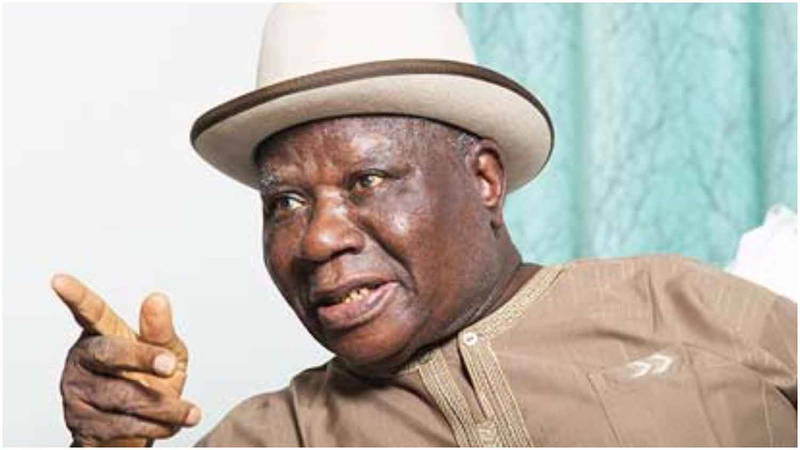Elder statesman and leader of the Pan Niger Delta Forum (PANDEF), Edwin Clark is dead.
Prof. C. C. Clark, a family representative, announced this on Tuesday in an official statement.
Clark passed away at the age of 97.
The former Federal Commissioner for Information was a prominent advocate for the South-South region and a key figure in Nigeria’s political landscape.
The statement read, “The Clark-Fuludu Bekederemo family of Kiagbodo Town, Delta State, wishes to announce the passing of Chief (Dr.) Sen. Edwin Kiagbodo Clark OFR, CON on Monday, 17th February 2025.
“The family appreciates your prayers at this time. Other details will be announced later by the family.”
He died just days after Ayodele Adebanjo, the elder statesman and chieftain of the pan-Yoruba socio-cultural organisation, Afenifere, died at the age of 96.
Before passing away, he had consistently spoken out about Nigeria’s national issues, particularly the tax reform bills.
READ ALSO: Chief Edwin Clark is dead
The late leader argued that the ongoing debate surrounding President Bola Tinubu’s Tax Reform Bills could only be resolved by restructuring the nation.
He believed that the discussions for and against the reforms would be settled once the country underwent restructuring and adopted either a new constitution or the 1963 Republican Constitution.
Clark pointed out that Nigeria’s complex tax system stemmed from the intersection of constitutional mandates, legislative provisions, and the practical aspects of revenue collection and distribution.
He emphasised that the design of the tax system should focus on encouraging efficient collection and central remittance, rather than solely concentrating on the fairness of revenue sharing.
The elder statesman also recognised tax reform as a long-standing contentious issue.
Despite the passage of time, he criticised the country’s inability to implement effective fiscal policies, blaming past leaders for mishandling the country’s diverse makeup.
In 2021, he warned leaders at all levels against politicising matters related to the security of lives and property, cautioning that such actions would only worsen the already unstable situation in Nigeria.
READ ALSO: Tinubu: Nigeria’s reforms will transform Africa
He issued this warning at a one-day ‘Retreat on Inclusive Security,’ organized by the Global Peace Foundation and Vision Africa in Abuja.
Late Clark urged the nation’s elite to refrain from making statements that could deepen the trust divide within the country.
He stressed that Nigeria’s survival should be treated as a sacred responsibility. Late Clark maintained that the resolution to the nation’s security crisis lay in restructuring.
He argued that the centralized security structure was inadequate and unable to swiftly address security concerns across the country.
According to him, restructuring was essential to establish state police and other local security mechanisms to address the nation’s security challenges.
He was a prominent advocate for state policing, especially as insecurity escalated during former President Muhammadu Buhari’s tenure.
Late Clark also argued that restructuring would promote effective governance and development, accelerating decision-making and fostering quicker progress for the people.
He believed the federal government’s powers were too centralized and that many of these powers would be better exercised by state and local governments.
As a respected Nigerian statesman, Ijaw leader, and politician from Delta State, Clark worked closely with military leaders Samuel Ogbemudia and General Yakubu Gowon between 1966 and 1975.
In 1966, he was part of an advisory committee to the military governor of the Mid-Western Region, David Ejoor, and later served as the Federal Commissioner for Information in 1975.
A philanthropist, the late Clark established the Edwin Clark Foundation and a university in his hometown.
His political career began in the pre-independence era when he was elected as a Councillor for Bomadi in 1953.
He later joined the National Council of Nigeria and the Cameroons (NCNC) and was active in the West African Students’ Union while studying at Holborn College.
Following the January 1966 military coup, the late Clark, along with other delegates from the Mid-West, opposed proposals for confederation raised at a constitutional conference initiated by Gowon.
The delegation’s mission was to preserve Nigeria’s unity, and they called for an adjournment when proposals for a loose federation were presented.
Late Clark served as the Midwestern Commissioner of Education, later taking on the role of Commissioner for Finance.
READ ALSO: Tinubu, Buhari, Obi mourn Adebanjo
As Commissioner for Education, he was instrumental in establishing the Mid-west College of Technology, which later evolved into the University of Benin.
During the Second Republic, he became a member of the National Executive Committee of the National Party of Nigeria (NPN) and served as the party’s treasurer in Bendel State (now part of Delta State).
In 1983, he briefly served as an elected senator in the final months of the Shagari administration.
In 1996, the late Clark declared himself a leader of the Ijaw nation, advocating for the Ijaw people during an ethnic conflict in Warri, Delta State.
He led Ijaw delegations in discussions with political leaders and later founded Edwin Clark University, which opened in 2015.



